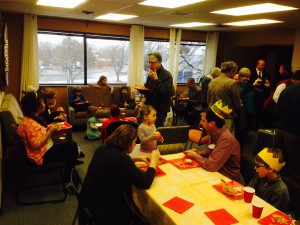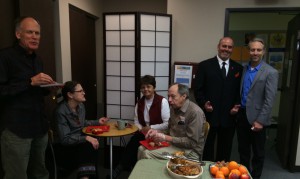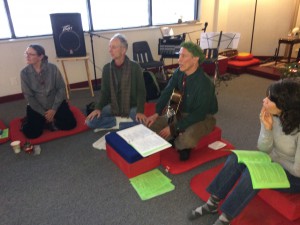Wednesday
Community ArticlesResources for Aging in Shambhala
Shambhala Working Group on Aging, 2014 UpdateCOLUMN: Aging in Enlightened Society
by Camille Yarbrough and Ann Cason
Camille and Ann will co-chair the Shambhala Working Group on Aging as of January, 2015
Statistics indicate some 70% of Shambhalians are 45 and over. Our baby-boomers swelling the “aging” category are often active, healthy, and frequently still employed. Others are dealing with illness or disability, or are facing death. Not everyone in our community knows that there is an organization devoted to exploring ways to meet the evolving needs of this majority of our membership.
The Shambhala Working Group on Aging was formed in 2008 at the inspiration of President Reoch and the Sakyong’s Council, with David Whitehorn as chair. The Working Group issued a Statement in 2009 identifying six points from which the group would work to “build an enlightened response to the inevitable process of aging.” David Whitehorn summarized the Statement, shown below, saying, “being older offers both (1) a rich opportunity for practice and contribution to creating enlightened society, and (2) challenges and needs for support arising from illness, disability or financial difficulties.”
The Working Group in 2009 recommended that each Shambhala center form its own aging group, to be supported by the international working group. Ann Cason and Jack Bodner, with the generous support of The Shambhala Trust, surveyed all Shambhala centers this year to determine their aging-related needs. Although the results are just now being analyzed, it is clear that very few centers have formal aging groups or care teams. Many survey respondents feel that whatever needs are being addressed currently represent only the “tip of the iceberg.”Statement on Aging in Shambhala
(1) The inherent nature of mind, basic goodness, being unconditional, does not change with age. No matter how old or infirm we may become, basic goodness remains fully intact.(2) Rather than viewing aging as leading to the fixation of long standing habitual patterns, with mind training (meditation practice), as we grow older there is the opportunity for mind to become more open and less fixed.
(3) Physical and mental capacities inevitably decline with increasing age.
(4) In Shambhala we can simultaneously recognize both the opportunity to be more openly engaged with the world as we grow older, and the inevitable decline in physical and mental capacities, culminating in death.
(5) In this context, ‘conventional’ retirement is a misguided myth. The idea that as we age we can ‘retire’ from the world and become less engaged is not consistent with Shambhala vision. Quite to the contrary, as our responsibilities and time commitment for family and livelihood decrease we can devote more time and energy to building enlightened society, as well as to our personal practices. This is ‘enlightened’ retirement.
(6) As we age many of us will, at some point, experience physical ailments that will make it difficult, or perhaps impossible, for us to care for ourselves. At those times, other members of Shambhala society need to be positioned to come forward to be sure that what we are unable to do for ourselves is done.
The survey indicates that while our community is certainly conversant with the reality of aging and death, the idea of the vicissitudes of aging brings up fear. For many the subject is preferably ignored. Many within this aging group hold positions in the three pillars, are active teachers and volunteers, and see themselves as “living” more than “aging.” It’s clear that we need a shift in the understanding of what it means to be aging within the context of Shambhala. It is notable that when the Sakyong was supplicated for the Rites of Passage for those reaching age 60, he encouraged the development of a program that points to the truth that we are all aging. Shambhalians relate to the important passages of aging every 10 years from age 20 through 100.
The Working Group will use the survey as a guide to communicate best-practices of centers with active aging programs, and to develop programs and services for people in their 50’s and beyond. These actions align with Point 5 of the 2009 “Statement” relating to the transition from making a living, not into retirement, but into a period of “Enlightened Living” wherein there is more time and impetus for helping build enlightened society. We are envisioning future programs designed to nurture this important transition.
Current offerings originating from the Working Group on Aging include the “Aging Series” of live online talks, “Rites of Passage,” and monthly “Aging in Enlightened Society” articles on the Shambhala Times. The 2015 Aging Series 3 will take a close look at “Aging with Dignity and Confidence.” Tentative live dates for centers and individual viewing are February 8, March 8 and April 5. In addition, the Denver Center is currently creating a video series of “Enlightened Aging” talks by local teachers that will be made available to other centers.Point 6 of the “Statement” addresses the need for support of those experiencing health problems and physical limitations. While many centers provide handicap access, and a few mobilize community care teams to provide short-term assistance, additional significant needs still require attention. Some centers have their own resources for death and dying. More communication about this will come in the future. In addition, the Working Group is investigating ways to assist Acharyas and the leadership in our community with age-related health and financial needs. According to David Whitehorn the formation of the group was originally inspired by concern for how to support these dedicated members.
Aging resources available through Shambhala websites include: shambhalaonline.org (hosts the Aging Series videos); shambhalatimes.org (search for Aging in Enlightened Society articles). For suggestions on starting aging groups please email Camille ([email protected]) and Ann ([email protected]).2014 Working Group on Aging Committee members are Andrea Sherman, Chair; Felice Owens, Marcia Usow, Jacquie Bell, Ann Cason, Lady Jane Ward, Cynthia Spencer, Donna Hanczaryk, David Whitehorn, Joanna Bolek, Gerry Haase, Jackie Roberts and Camille Yarbrough.
The Working Group on Aging falls under the auspices of Mary Whetsell, Director of the Office of Societal Health and Well-being, and Deputy Director Ed Hargadon.









Dec 26, 2014
Reply
But isn’t it true that if your mental capacities decline significantly, such as Alzheimer’s or other severe dementia, that you are less aware of your Basic Goodness? Can we say something about that? I personally don’t understand what happens when the Awake Practitioner becomes severely demented?